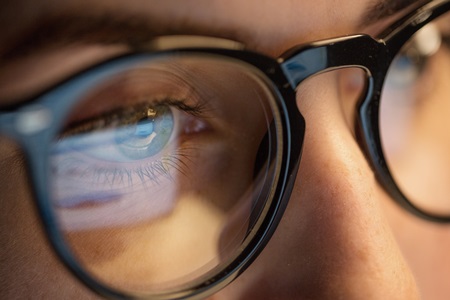Excessive blue light exposure leads to poor quality sleep and more.
 From smartphones to computers, laptops, and tablets, we are all accustomed to using digital screens for work, for play, and everything in between. But the constant glare from screens or monitors can lead to headaches, blurred vision, tired eyes, or poor sleep patterns—even eye damage or other health concerns.
From smartphones to computers, laptops, and tablets, we are all accustomed to using digital screens for work, for play, and everything in between. But the constant glare from screens or monitors can lead to headaches, blurred vision, tired eyes, or poor sleep patterns—even eye damage or other health concerns.
Exposure to a natural source of blue light occurs when we are outdoors in the sunlight. However, when people are subjected to too much light, especially after sundown, the circadian rhythm (biological clock) is disrupted and suppresses the natural production of melatonin. This can lead to poor quality sleep, which can increase the risk for depression, cardiovascular problems, or diabetes.
“Increasing exposure to blue light from digital devices has the potential to damage retinal cells in the eye,” said Optometrist Dr. Joe Schneiderhan. “Studies show blue light exposure may pose risks for macular degeneration relating to aging, leading to progressive vision loss.”
Special lenses are available to filter out blue light and prevent it from harming your eyes. These include blue-light filtering lenses in standard eyeglasses, filters or covers for computer monitors, and even smartphone apps. “Blue light filter apps, PC monitor settings, or monitor covers change the color spectrum from cool blues to warmer tones on a screen. Their protection for your eyes is made even more effective when combined with light-filtering glasses,” added Dr. Schneiderhan. Blue-light filters can be applied to standard prescription glasses and for those who don’t need prescription eyewear, over-the-counter, non-prescription glasses are available.
With more people working and schooling remotely, there are greater chances for over-exposure to blue light. If your eyes are tired, sore, and you are experiencing more headaches, it may be caused by over-exposure to digital screens. After employing one of these measures to filter blue light, your sleep patterns or other symptoms should improve. Always be sure to talk to your family healthcare provider or optometrist to rule out other causes.
Our team is here to help you identify the cause of any concerns and discuss options.